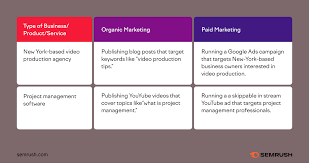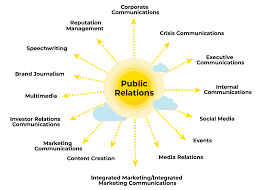Exploring a Compelling Content Marketing Example for Business Success
The Power of Content Marketing: An Example
In today’s digital age, content marketing has become a crucial strategy for businesses looking to engage with their target audience and drive conversions. Let’s explore a compelling example of how effective content marketing can make a significant impact.
Case Study: XYZ Company
XYZ Company, a leading tech startup, wanted to increase brand awareness and attract more customers to its innovative software solutions. They decided to implement a content marketing strategy to achieve their goals.
First, XYZ Company conducted thorough research to understand their target audience’s needs and preferences. They identified key pain points that their software could address and developed high-quality content that provided valuable insights and solutions.
XYZ Company created a series of blog posts, infographics, videos, and case studies showcasing the benefits of their software in solving common industry challenges. They also leveraged social media platforms to promote their content and engage with their audience.
Results
Within a few months of implementing their content marketing strategy, XYZ Company saw significant results:
- Increased website traffic by 40%
- Doubled the number of leads generated
- Gained recognition as an industry thought leader
- Improved customer retention rates
The success of XYZ Company’s content marketing campaign not only boosted brand visibility but also established credibility and trust among their target audience. By consistently delivering valuable and relevant content, they were able to build strong relationships with customers and drive business growth.
In Conclusion
This case study exemplifies the power of content marketing in driving business success. By creating engaging and informative content tailored to the needs of their audience, businesses can enhance brand awareness, attract new customers, and foster long-term relationships.
9 Essential Tips for Effective Content Marketing Success
- Understand your target audience and their needs
- Create high-quality and engaging content
- Utilise various content formats such as blogs, videos, infographics, etc.
- Consistently publish content to maintain audience engagement
- Optimise your content for search engines (SEO)
- Promote your content on relevant platforms and channels
- Measure the performance of your content through analytics
- Iterate and improve based on data and feedback
- Build relationships with influencers for wider reach
Understand your target audience and their needs
To excel in content marketing, it is crucial to thoroughly understand your target audience and their specific needs. By conducting detailed research and analysis, businesses can gain valuable insights into what resonates with their audience, allowing them to create tailored content that addresses their pain points and interests. This approach not only helps in establishing a strong connection with the target demographic but also increases the effectiveness of the content in driving engagement and conversions. Ultimately, by prioritising an audience-centric approach, businesses can ensure that their content resonates with the right people and delivers tangible results.
Create high-quality and engaging content
Creating high-quality and engaging content is a fundamental aspect of a successful content marketing strategy. By producing content that is informative, relevant, and valuable to your target audience, you can capture their attention and build credibility for your brand. High-quality content not only helps establish your expertise in the industry but also encourages audience engagement and interaction. Whether it’s through blog posts, videos, infographics, or social media posts, investing in creating compelling content can drive traffic to your website, generate leads, and ultimately lead to conversions. Remember, quality always trumps quantity when it comes to content marketing.
Utilise various content formats such as blogs, videos, infographics, etc.
To maximise the impact of your content marketing strategy, it is essential to utilise a diverse range of content formats. Incorporating blogs, videos, infographics, and other formats can help you cater to different audience preferences and capture attention in various ways. Blogs are great for in-depth explanations and thought leadership, while videos can engage visual learners and convey complex information effectively. Infographics are ideal for presenting data in a visually appealing format that is easy to digest. By leveraging a mix of content formats, you can enhance engagement, reach a wider audience, and create a more dynamic and compelling content marketing campaign.
Consistently publish content to maintain audience engagement
To maintain audience engagement, it is essential to consistently publish high-quality content that resonates with your target audience. By regularly providing valuable and relevant information, businesses can keep their audience interested and coming back for more. Consistency in content creation not only helps in building brand credibility but also establishes a strong connection with customers over time. Whether it’s blog posts, social media updates, videos, or infographics, maintaining a steady stream of content keeps the audience engaged and reinforces the brand’s presence in their minds.
Optimise your content for search engines (SEO)
To maximise the impact of your content marketing efforts, it is essential to optimise your content for search engines (SEO). By incorporating relevant keywords, meta tags, and high-quality backlinks, you can improve your content’s visibility and ranking on search engine results pages. Effective SEO practices not only help attract organic traffic to your website but also enhance the overall user experience. By focusing on SEO optimisation, you can ensure that your valuable content reaches a wider audience and drives meaningful engagement with your target market.
Promote your content on relevant platforms and channels
To maximise the impact of your content marketing efforts, it is essential to promote your content on relevant platforms and channels. By identifying where your target audience is most active and tailoring your promotion strategy to those channels, you can reach a wider audience and increase engagement. Whether it’s social media platforms, industry-specific forums, or email newsletters, choosing the right channels to promote your content will help you connect with the right people at the right time, ultimately driving better results for your business.
Measure the performance of your content through analytics
Measuring the performance of your content through analytics is essential for understanding the effectiveness of your content marketing efforts. By analysing key metrics such as website traffic, engagement rates, conversion rates, and social media interactions, you can gain valuable insights into what is resonating with your audience and what may need adjustment. Tracking these metrics allows you to make data-driven decisions to optimise your content strategy, improve ROI, and achieve your marketing goals more effectively.
Iterate and improve based on data and feedback
To achieve success in content marketing, it is essential to iterate and improve based on data and feedback. By analysing metrics such as engagement rates, click-through rates, and conversions, businesses can gain valuable insights into the effectiveness of their content strategies. Additionally, listening to feedback from customers and adjusting content based on their preferences and suggestions can help enhance relevance and engagement. Continuous iteration and improvement based on data-driven decisions ensure that content remains impactful and resonates with the target audience, ultimately leading to better results and long-term success in content marketing efforts.
Build relationships with influencers for wider reach
In the realm of content marketing, forging relationships with influencers can significantly amplify your reach and impact. By collaborating with influencers who resonate with your target audience, you can leverage their credibility and authority to enhance the visibility of your content. Engaging with influencers allows you to tap into their loyal followers and expand your brand’s presence across diverse platforms, ultimately driving greater engagement and fostering a sense of authenticity that resonates with a wider audience.








